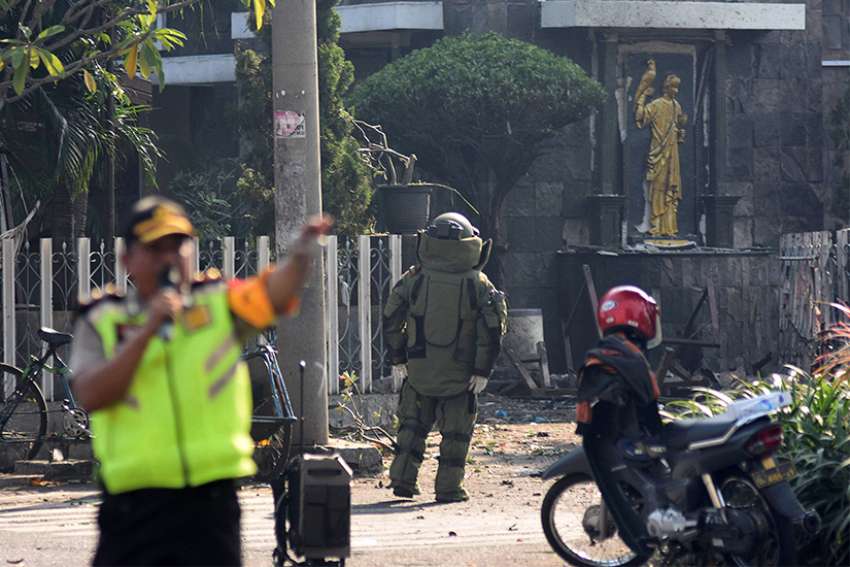“Justice, and only justice, you shall pursue” is the theme the ecumenical team from Indonesia chose for the eight-day period between the feasts of St. Peter and St. Paul (Jan. 18-25). The passage from the Book of Deuteronomy comes from a section of Mosaic law that condemns corruption among judges and political leaders (Deut. 16:18-20).
The Week of Prayer’ theme is chosen by Christians in a different country each year. The theme serves as an invitation to pray for the unity of all Christians around the world.
“Indonesia has quite a poor reputation for justice, especially due to the weak legal system,” said Evan Widjaja, co-president of Mudika Toronto, the youth group of Toronto’s small Indonesian Catholic community.
Members of that community were among those who protested and prayed in Nathan Phillips Square in 2017 when Jakarta’s former governor, a Catholic, was sent to prison for two years for supposedly insulting Islam.
Basuki Tjahaja Purnama, known as “Ahok,” was targeted with Indonesia’s blasphemy law after he had referenced a passage of the Quran in a speech during his run to become president of Indonesia, where only about 10 per cent of the country is Christian.
“This verdict demonstrates the inherent injustice of Indonesia’s blasphemy law, which should be repealed immediately,” Amnesty International said when Purnama’s sentence was handed down in May of 2017. “Despite protests of his innocence and evidence that his words were manipulated for political purposes, he has been sentenced to two years in jail. The verdict will tarnish Indonesia’s reputation as a tolerant nation.”
Purnama had built a reputation as a social reformer who raised the minimum wage and encouraged more participation in Indonesian democracy by the poor. Muslim preachers and the hardline political party Islamic Defenders Front had campaigned against Purnama on the basis that he was ethnically Chinese and religiously Christian.
Purnama’s sentence under the blasphemy law received attention around the world, but many ordinary Indonesians suffer under a combination of a flawed legal system and malicious gossip on social media, Widjaja said.
“There are also other examples of how the law was quick to act on matters concerning poorer people, but was relatively slow when investigating larger matters — such as corruption or human rights matters,” he said.
Transparency International ranked Indonesia 96th in its world corruption rankings for 2017, tied with Brazil, Colombia, Panama, Peru, Thailand and Zambia.
“For us, justice is very important,” said Fr. Yonanes Yuliwan Maslim, the pastor of Toronto’s Catholic Indonesian community, which meets monthly at St. Anselm’s Parish in Toronto’s Leaside neighbourhood.
Maslim said the experience of living as a minority in the world’s largest Muslim-majority nation has sharpened the Christian instinct for justice among both Protestant and Catholic Indonesians.
“In reality, sometimes we face discrimination,” he said. “If you are a Christian, especially in the government, sometimes it’s not so easy.”
One result of this is that Protestant and Catholic Indonesians find common ground very easily, Maslim said. “In general, we work together,” he said. “We are Indonesian citizens. We have to work together as citizens of this country.”
Mixing politics and religion is dangerous, said Widjaja.
“They’re supposed to be two separate entities. In Indonesia there are a lot of different ethnic groups. There are a lot of different religions. When you are doing politics, you need to make sure the needs of different groups, different ethnicities and different religions are fulfilled. When you mix both of them, there’s going to be some biases and some subjectivity when you create policies.”
But religion can be used to foster a sense of the common good, said Maslim.
“We try not to say minority anymore. For us, it’s not the problem — minority or majority. We are the same, Indonesian,” he said. “We have many languages. There are many different cultures from Sumatra to Papua. We try to be Indonesian and also Catholic.”
Maslim will lead a delegation from his parish to an ecumenical evensong at St. James Anglican Cathedral in Toronto on Jan. 27, 4:30 p.m., to close out this year’s Week of Prayer for Christian Unity.
More information about the week can be found at weekofprayer.ca.
Support The Catholic Register
Unlike many other news websites, The Catholic Register has never charged readers for access to the news and information on our site. We want to keep our award-winning journalism as widely available as possible. But we need your help.
For more than 125 years, The Register has been a trusted source of faith based journalism. By making even a small donation you help ensure our future as an important voice in the Catholic Church. If you support the mission of Catholic journalism, please donate today. Thank you.

